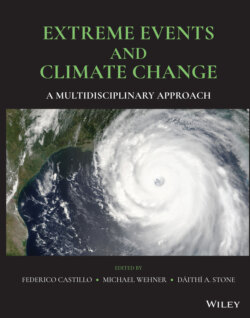Читать книгу Extreme Events and Climate Change - Группа авторов - Страница 16
1.2.1. Weather Extremes or Impact Extremes?
ОглавлениеWe will start first with the distinction between weather and impacts (of weather). Although the distinction is generally commonly understood for long‐term impacts of long‐term climate changes, this is not the case with extremes. Extreme weather is often confused with natural hazards. For instance, in its review titled Attribution of Extreme Weather Events in the Context of Climate Change, the US National Academy of Sciences in fact considered natural hazards including floods and wildfires (National Academies of Sciences, Engineering, and Medicine, 2016). However, in the most recent IPCC assessment report, floods and wildfires are considered to occur outside of the climate system in the hydrological and ecological systems, respectively (Cramer et al., 2014; Settele et al., 2014).
In this chapter we will distinguish between “extreme weather events” and, for lack of a better term (Cramer et al., 2014), “extreme impact events.” We will consider an “extreme weather event” to be any event in the climate system that is episodic in nature and is far from average in some standard climatological measure. “Far from average” is ill‐defined, but we may consider fairly mundane mid‐latitude storms even if they are not all that rare. An “impact event” is something like a flood (hydrological event), wildfire (ecological event), pest outbreak (agricultural event), or stock market crash (economic event), also being episodic and far from average, but occurring outside of the climate system.
Why care about this syntax? Just as an extreme weather event need not necessarily result in an extreme impact event, an extreme impact event may happen regardless of what the weather is doing. For example, in warmer climates (i.e., where snowmelt is not a factor) inland floods usually occur under conditions of heavy rainfall over some period of time. But it is also possible for floods to occur for other reasons unrelated to rainfall, such as under a controlled dam release for downstream ecological support or when urban water mains or sewer systems fail. Note also that an extreme weather event (or series thereof) may have long‐term consequences beyond an immediate impact due to destruction of infrastructure. Is it more appropriate then to focus on weather events or impact events? It depends on the purpose. For instance, although Cramer et al. (2014) generally considered their remit to focus on impact events, the assessment with regards to the extreme RFC was explicitly focused on weather events (and the risk implied by their occurrence). This chapter is motivated by the effects of extreme weather, and so the focus will be on that, but we will keep in mind that extreme weather events do not necessarily equate to extreme impact events.
